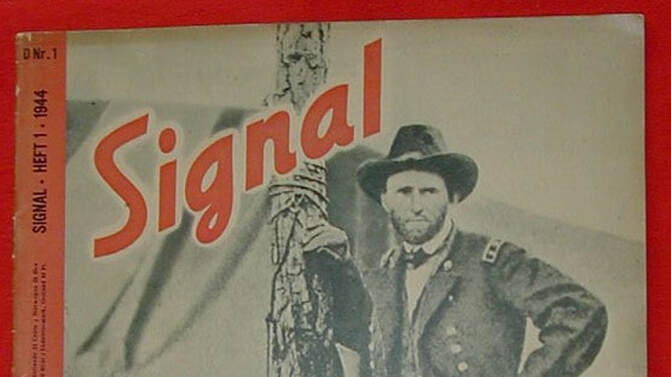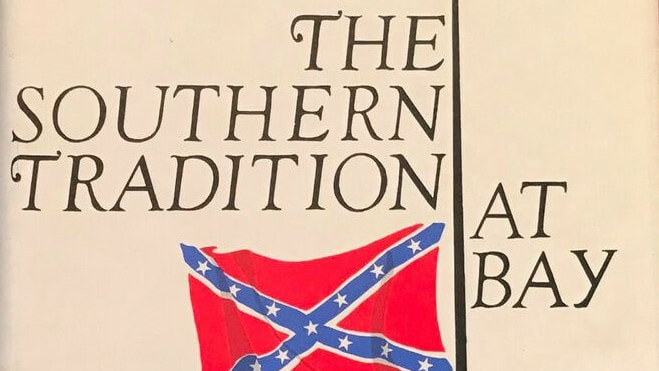|
For Germans, Prussians in particular, the American Civil War presented a great teaching school in the art of mid-nineteenth century warfare. Heros von Borcke comes quickly to mind, but years afterward Der Sezessionskrieg continued to fascinate German miliary theorists. In 1937 five officers of the German high command traveled to America to visit Civil War battlefields. This inspired Mississipian Lawrence Wells to write a novel, Rommel and the Rebel (1986), in which the future field marshal comes to learn blitzkrieg tactics from the famed exploits of Bedford Forrest. In the novel, Rommel bumps into William Faulkner, leading the novelist to remark, “I hate the goddamned Huns but I like Rommel.” But the Krauts weren’t interest in Rebels alone, as shown by the German propaganda magazine Signal. Here, on the front cover of a 1944 issue, printed in English (Signal was printed in thirty languages), stands… …General Grant! The well-known photograph shows the Union general after Cold Harbor. Why Signal chose this image for its cover is a question, I suppose, that only Josef Goebbels could have answered.
1 Comment
Recently, as an antidote to the craziness occurring in the United States today—identify its countless variations however you will—my wife and I sojourned from our northeast Georgia home to the family place on Saint Simons Island. Packing a book or two for the week-long trip, I stumbled upon the idea of taking along Richard M. Weaver’s The Southern Tradition at Bay (1968), which I had begun to read decades ago in graduate school. The copy remains one of the prizes in my library. In re-reading Weaver’s opus I was quickly rewarded. Richard Malcolm Weaver was born in Weaverville, in western North Carolina, in 1910. He earned a bachelor’s degree in English at the University of Kentucky in 1932. Then followed a master’s at Vanderbilt. John Crowe Ransom supervised his thesis, “The Revolt Against Humanism” (the title itself shows young Weaver’s philosophical bent). In 1940 he began doctoral work at LSU, where his dissertation (1943) was entitled “The Confederate South, 1865-1910: A Study in the Survival of a Mind and a Culture.” After a year of teaching at NC State he joined the English faculty at the University of Chicago, where he spent the rest of his career (though summering back in Weaverville). Dr. Weaver revised his dissertation for publication, adding an introduction and epilogue, and entitling it The Southern Tradition at Bay: A History of Postbellum Thought. He submitted his work to at least one publisher but was rejected. That he kept it through the decades suggests his eventual hope still to have it as a book. The MS was found among Weaver’s papers after his death from cerebral hemorrhage in 1963. Weaver’s literary executor, his brother-in-law Kendall Beaton, decided to seek publication of The Southern Tradition at Bay, and providentially secured a Foreword from the preeminent man of Southern letters, Donald Davidson, before the latter’s death in 1968. Weaver’s sister, Polly Weaver Beaton, then secured professors George Core and M. E. Bradford as final editors of STB, which was published in 1968. (My copy—Arlington House, New Rochelle NY—in its original dust jacket is priced at $7. GOOGLE the book today and you’ll find that its current reprint goes for $89.99 hardcover and $159.98 paper.) Weaver explained that in research for his dissertation he spent three years reading “the history and literature of the Civil War, with special attention to that of the losing side….first-hand accounts by those who had actually borne the brunt of it as soldiers and civilians.” Nonetheless Professor Davidson points out that this isn’t a book on Confederate historiography, but an enunciation of the Southern people’s values, and their worth when contrasted with those currently evident in the rest of the nation (meaning, really, the North). Davidson is so right. A mere perusal of STB yields these gems:
In STB Dr. Weaver meditates upon many differences between Southerners and Northerners, and one of them concerns general perspectives on religion. “The average Southerner,” he writes, “knew little and appears to have cared less about casuistical theology or the metaphysics underlying all religion; what he recognized was the acknowledgment, the submissiveness of the will, and that general respect for order, natural and institutional, which is piety…The Southerner did not want a reasoned belief, but a satisfying dogma.” New England, on the other hand, was settled in the early years by people who had been embroiled in religious feuds, which they found occasion for renewing after they had set themselves up in the New World. The doctrinal differences which resulted in the exiling of Anne Hutchinson and Roger Williams, in the withdrawal of Thomas Hooker from the Bay Colony, and which later cost Jonathan Edward and Ralph Waldo Emerson their pulpits are instructive cases in point. Such troubles ensue only when doctrinaires arise to make assent a matter of intellectual conviction. In New England the forces of dissent finally won the day. The right to criticize and even to reject the dogmas of Christianity became at length more important than the will to believe them….A conclusion to be drawn from these trends…is that New England, acting out of that intellectual pride which has always characterized her people, allowed religion to become primarily a matter for analysis and debate. These different perspectives on religion, the Southerner’s and the New Englander’s, Weaver expresses in different ways, each building upon his central point: “New Englanders cultivated metaphysics and sharp speculation; Southerners generally, having saved their faith, as they thought, from the whole group of pryers, reformers, and troublesome messiahs, settled back and regarded it as a part of their inheritance which they did not propose to have disturbed”; “while the Puritan was attempting to make his religion conform to the canons of logic, conscience, or ethical propriety, the Southerner clung stubbornly to the belief that a certain portion of life must remain inscrutable, and that religion offers the only means of meeting it, since reason cannot here be a standard of interpretation”; “in the sphere of religion the Southerner has never been friendly to the spirit of inquiry. He felt, with what may now appear prophetic instinct, that a religion which is intellectual only is no religion. In contrast to his cousin in the North, he has been willing to accept the mystery.” As an underpinning for his own inimitable prose and in support of his expansive ideas, Dr. Weaver quotes widely from the antebellum journals whose writings helped define what a Southerner was (or still is), in the first place. Here, from the Southern Literary Messenger of June 1860, on Northerners’ lack of a sense of measure: “having liberty which they do not appreciate, they run into anarchy,--being devotional, they push piety to the extremes of fanaticism,--being contentious withal, they are led to attack the interests of others merely because those interests do not comport with their ideas of right.” “In this way the Southern people reached the eve of the Civil War,” writes Dr. Weaver, …almost untouched by the great currents of rationalism and skepticism, and their allegiance to the older religiousness was reflected in their fighting men. Into the strange personnel of the Confederate Army, out of “regions that sat in darkness,” poured fighting bishops and prayer-holding generals, and through it swept waves of intense religious enthusiasm long lost to history. And when that army went down to defeat, the last barrier to the secular spirit of science, materialism, and democracy was vanquished. Musing on this exquisitely thought-provoking book, I began to think that reading it presupposes several things. One is that there is something conceivable as the “Southern mind”—which itself presupposes a few corollaries: a) that the mind of the South is what we should be concerned about, not the Southern viscera; b) that the Southern mind is something discernible and cohesive; and c) that its aspects and tenets are worth studying and thinking about in the first place. Weaver’s context is that the Southern mind can be differentiated from that of the North (and by extension, the rest of America). These days we can worry about the Coronavirus all we want, but most people believe that eventually science will find a way for us to get out of the COVID19 era. Not so for the cultural malaise we are currently experiencing in this country; there is no scientific solution for that. Perhaps only looking beyond and outside of American society, with its violence, social unrest, conflicts and fears, might one perceive a better way of life that might be at least approachable, if not attainable. And as for that final corollary: it goes without saying (except here, just once) that the “Southern mind” is that possessed by Southerners, those individuals for whom that regional appellation comes first and foremost as a personal identifier (as opposed to, say, African Americans, who I suspect would choose race as their first identifier). The final presupposition--that reading Richard Weaver today can be an intellectual, moral or ethical journey to another (better) place and time—is expressed in the author’s words themselves when he quotes De Bow’s Review from October 1857: “From the Bible and Aristotle, we can deduce (added to our own successful experiment) quite enough to build a new philosophy on the ruins of the present false and vicious system.” Present false and vicious system indeed. |
AuthorStephen Davis of Cumming, Georgia, is author of six books on the Atlanta Campaign, including recently Texas Brigadier to the Fall of Atlanta: John Bell Hood (Mercer, 2019). Archives |
Proudly powered by Weebly


